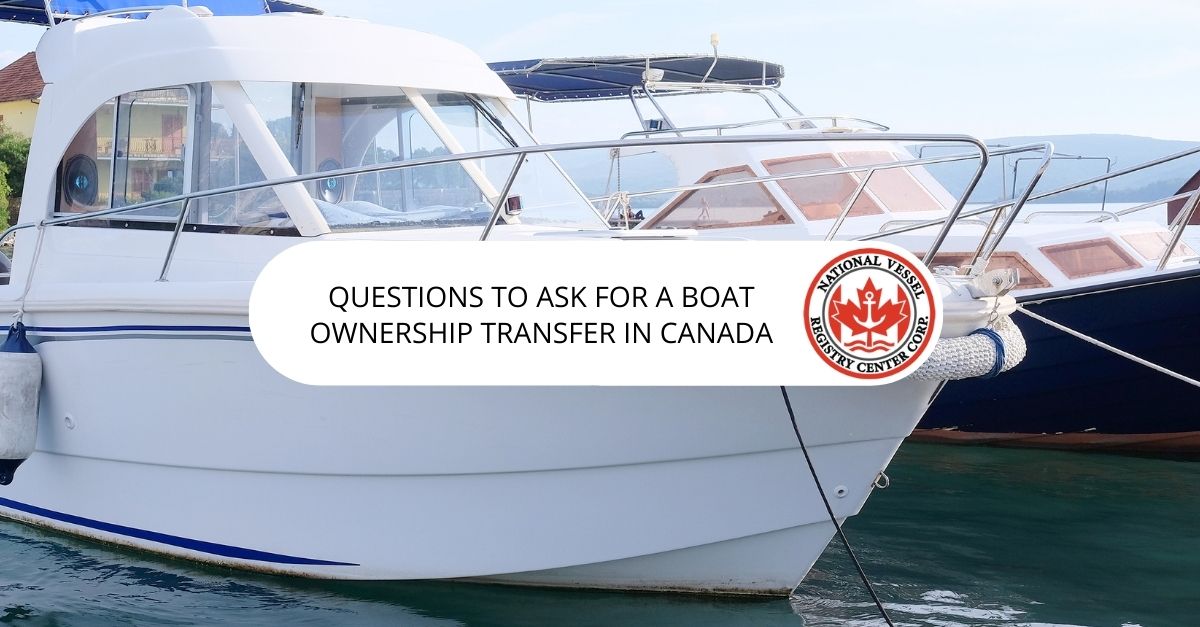Suppose you are purchasing a boat that has already been registered in Canada, and you are a Canadian citizen or a permanent resident. In that case, you must go through the process of boat ownership transfer. It entails completing a few stages, but it may be done whenever one chooses, and neither deadlines nor costs must be paid.
The procedure for transferring ownership of a yacht is not very complicated; all that is required is to make the appropriate contacts and carefully adhere to the directions that they provide. However, since so many processes ensure that everything is noticed, it is simple to get perplexed or overwhelmed. If you want to make sure that everything goes as well as possible, here are some questions you should ask your broker or seller.
How Long Will The Boat Ownership Transfer Process Take?
When you factor in the time to register the transaction and receive a Bill of Sale for the new owner, transferring ownership from one person to another might take several months. Both the rules and deadlines outlined in the Canada Shipping Act must be strictly adhered to. Once the written contract has been received and acknowledged by both parties, the seller and the buyer have 15 calendar days to inform Transport Canada of their intention to transfer ownership.
If you notify Transport Canada of your boat, they will provide a registration number within ten business days. Within 15 calendar days of acquiring this number, the new owner must register the boat with the Registrar of Vessels in their province or territory. There may be extra costs associated with registering in some jurisdictions. How you proceed with your legal representation will be determined by the type of ship you own.
What Paperwork Is Necessary?
Title transfers only apply to vessels registered in Canada. If you’re looking to buy a ship that isn’t Canadian-flagged, you should talk to a lawyer or legal professional about the specifics of the laws and customs that apply to foreign-flagged ships. If all the paperwork is in order, the process is simple: the buyer and seller each sign a bill of sale officially recording the boat ownership transfer. Additionally, the purchaser must submit a completed application for registration and payment documentation (such as a check or bank draft) before the transaction can be finalized.
The seller must also provide receipts and maintenance records for the vessel. These measures are sufficient for transferring ownership in most cases, but additional measures may be necessary depending on the parties involved. If the original owner has passed away and there is an estate or trustee sale, you will likely need more background information about the decedent before making a purchase.
What Are The Tax Implications of a Boat Ownership Transfer
Buying a home in a new region necessitates a trip to the local registrar’s office so that the title may be changed to your name. Buying an automobile requires a visit to the provincial register office, where you may have the title changed to your name. No such procedure exists, however, for marine vessels. To change boat owners, you need to do more than visit a registered office and fill out some forms.
While specific regulations vary by state, in most cases, a boat must be registered to a person or company having a physical presence in the province, and the vessel must be included as an asset on the owner’s property tax return. If one person owns 80% of a yacht and another owns 20%, both people are still responsible for paying the real property taxes.

What Should I Do if The New Owner Doesn’t Live In Canada?
You’re in the U.S., yet the new boat owner is from Canada. Please tell me what it is that you do. It is possible to register a yacht in a state that does not border your own if you reside in one that allows reciprocal registration, but there are certain restrictions you should be aware of. Each state has rules about how long a boat may be in port before it must be registered and how long a non-resident can keep a boat before being subject to the state’s boat registration tax.
Make sure you only leave the boat’s registration active for a short time by researching the relevant legislation in your state (and the state of the new owner). The new owner may finish the papers at your home or theirs if they do not reside in Canada. You may have a lawyer or notary public in the buyer’s jurisdiction witness the transfer of property if the buyer does not reside nearby.
As you can see, the process of boat ownership transfer can be complicated, especially in Canada. You first need to contact the National Vessel Registry Center today at +1 (800) 419-9569 (Canada) for more information.

